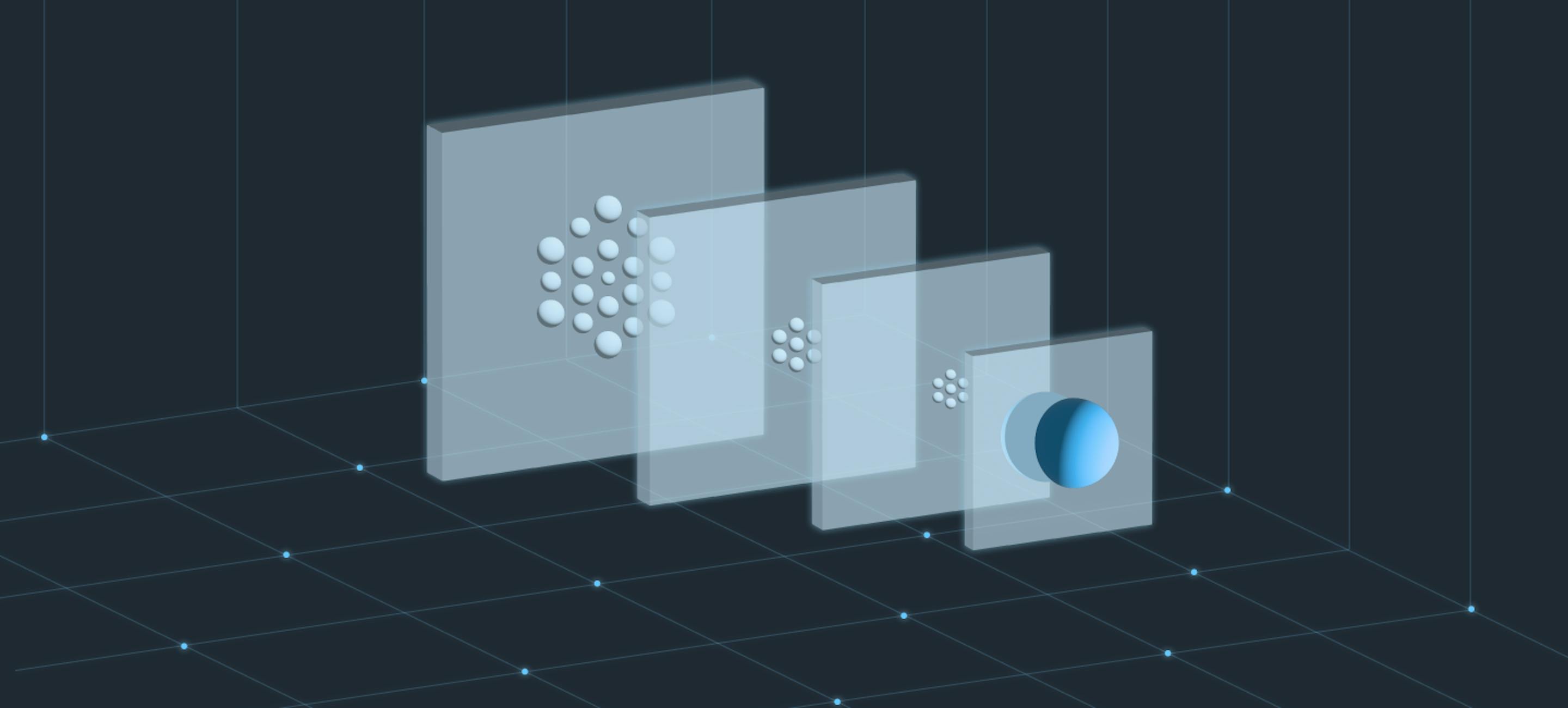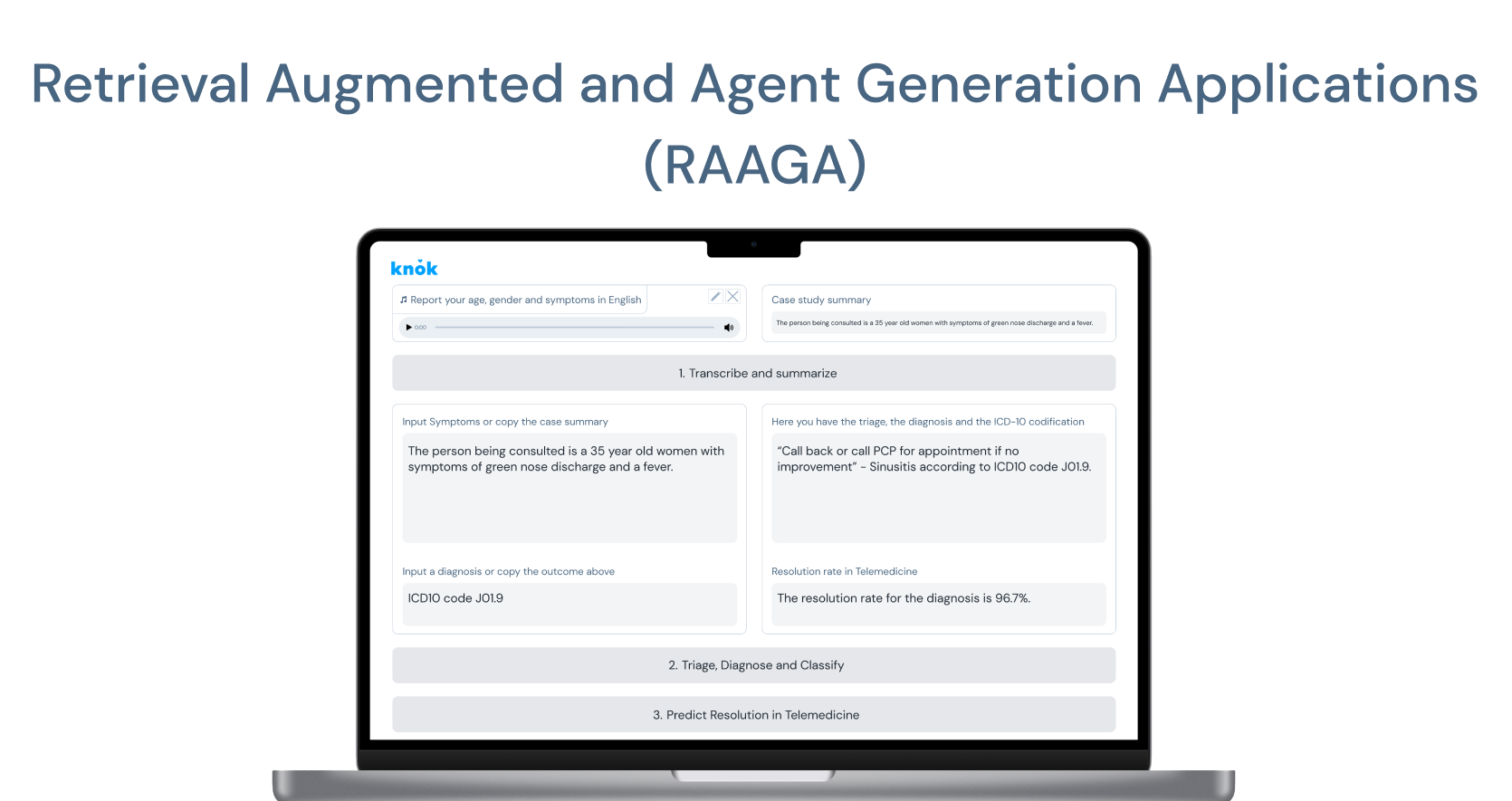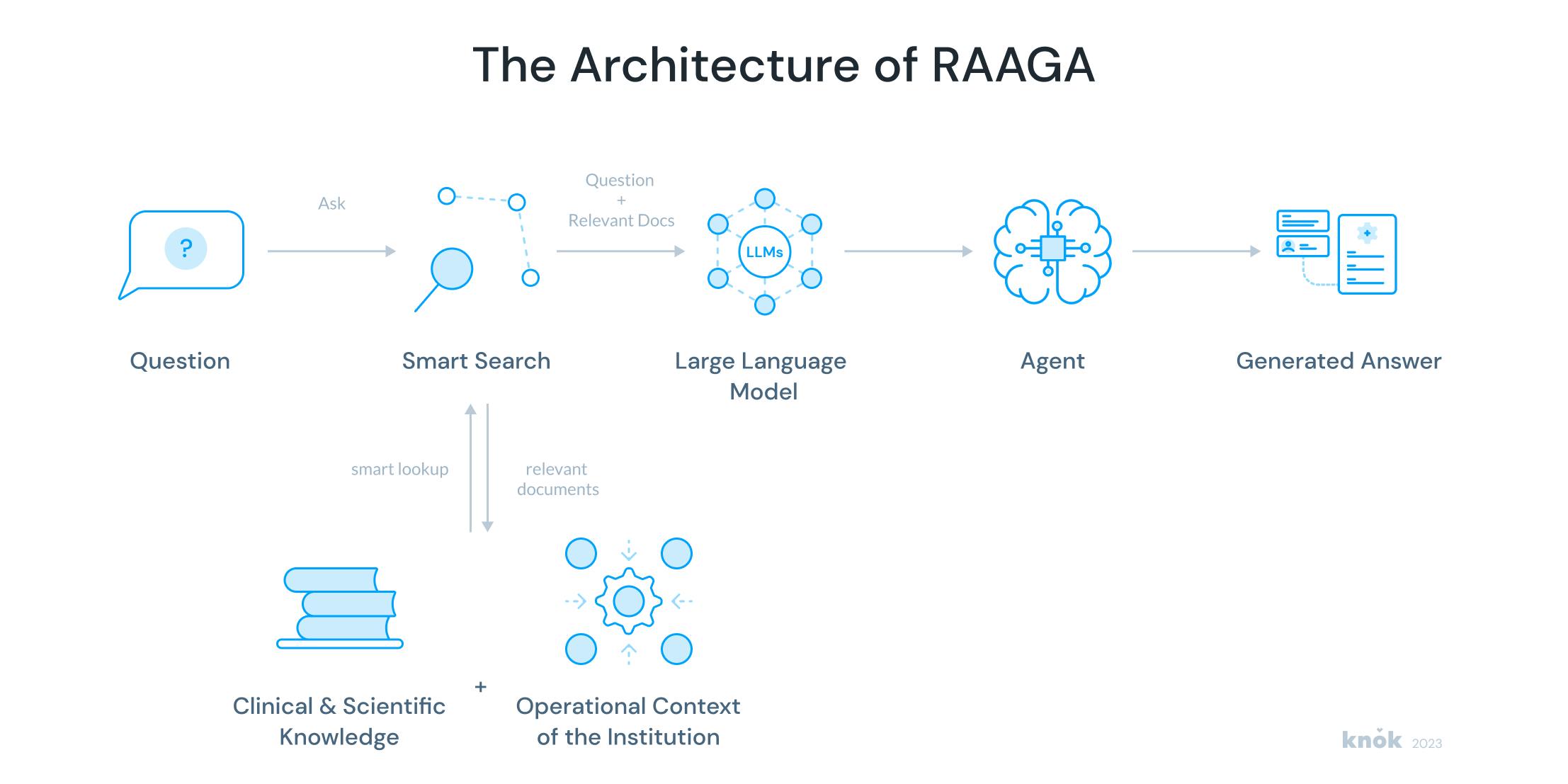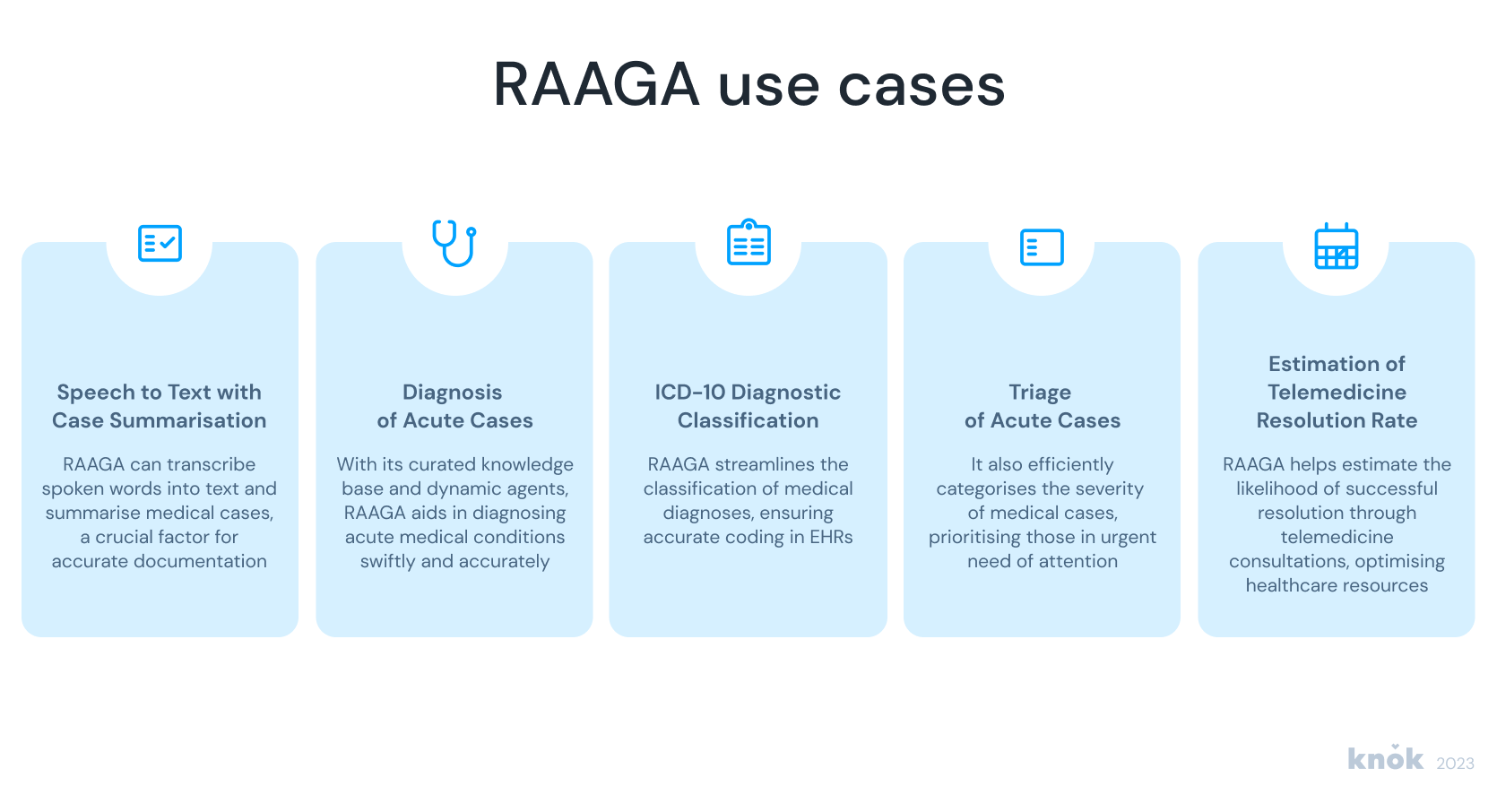
Revolutionising healthcare with RAAGA: knok’s AI solution
Get to know knok's unique AI solution for ultra-personalised healthcare.
In the dynamic landscape of artificial intelligence (AI), generative models have become a cornerstone of innovation. Retrieval Augmented Generation (RAG) and agent-based models are two breakthrough technologies that, when combined, are reshaping the capabilities of AI chatbots. This article will explore the evolution of generative AI, delve into the strengths and limitations of LLM-based models such as ChatGPT, and introduce a promising newcomer to the digital health scene: knok’s Retrieval Augmented and Agent Generation Applications (RAAGA).

Understanding fundamental concepts
Generative AI is essentially the capability of machines to generate human-like text or content, being the driving force behind chatbots, virtual assistants, and content generation systems. They are a class of computational systems developed to autonomously craft novel content by extrapolating patterns and relationships from vast datasets. Generative AI is powered by deep neural networks, such as recurrent or transformer-based models, which are trained on substantial knowledge of human-generated data.
These models learn to decipher intricate linguistic or visual nuances, enabling them to fabricate coherent and contextually relevant outputs. This technology's significance is highlighted by its transformative potential across diverse domains, from text generation to innovative problem-solving.
Retrieval Augmented Generation (RAG) takes generative AI a step further by integrating retrieval-based components.This integration seeks to overcome the limitations of generative models by incorporating structured access to external information, effectively combining the fluency and creativity of generative AI with the precision and relevance of retrieval systems.This retrieval can be done using various techniques, such as keyword-based searches or more advanced methods like dense vector retrieval using pre-trained language models like BERT or variants.
The RAG model has the ability to understand complex patterns in data and generate human-like text through the filter of retrieved knowledge, enabling itself to provide responses that are not only creative but also firmly grounded in factual information.
Finally, agent-based models (ABMs) introduce dynamic agents that simulate real-world entities. These agents interact within defined environments, adapting their responses based on predefined rules, making them particularly useful in complex, specialised scenarios. They are a valuable tool for studying various real-world scenarios, such as social, biological, and economic systems.
In this sense, Generative AI and RAG models together with ABMs have complementary roles, being able to simulate complex systems with relevant contextual information and make decisions based on its knowledge data, leveraging context-rich responses and adapted behaviour to every possible scenario.

The ChatGPT paradigm and its application to healthcare
Leading the way in generative AI, ChatGPT, powered by large language models (LLMs), is the most popular tool of modern AI. ChatGPT was designed to generate coherent and contextually relevant text, making it suitable for a wide array of applications, including virtual assistants and chatbots.
Even though the AI platform collects many tools such as fluent language generation and versatility, it still presents limitations in some crucial factors such as lack of contextual memory, restricted customisation, generation of biassed or inappropriate content and knowledge restrictions.
It is clear that ChatGPT has made significant inroads into the healthcare sector, demonstrating how AI has potential to assist medical professionals by providing quick access to information, suggesting potential diagnoses, and offering support to patients. However, it is far from the perfect solution due to its limitations in retaining context and its lack of healthcare specialisation.
Specialised Healthcare AI Chatbots
75% of health executives believe that generative AI has the potential to reshape the industry, according to the Bain Health Systems Survey 2023. Recognising the need for healthcare-specific solutions, new AI chatbots solely dedicated to the medical field have emerged. These bots are designed to provide accurate information, aid in diagnosis, and offer support in a digital health context. Their focus on healthcare-related tasks ensures precision and reliability in medical scenarios.
Since recognising AI’s potential, the healthcare sector has witnessed a surge in specialised AI chatbots tailored to address specific medical needs, such as Infermedica’s AI-driven triage system, which assists in evaluating symptoms and guiding patients to appropriate levels of care. Also, more recently, Google joined the healthcare AI pool with Med-PaLM, which is a medical trained version of their own LLM-based chatbot PaLM that was even able to reach an accuracy of 86.5% on United States Medical Licensing Examination questions.
These specialised healthcare AI chatbots cater to distinct medical needs, from symptom assessment to specific health support, and play a pivotal role in enhancing healthcare accessibility and efficiency. However, the evolution of AI in healthcare is not limited to chatbot variations. The emergence of knok’s Retrieval Augmented and Agent Generation Applications (RAAGA) further enriches this landscape, promising even more efficient and ultra-personalised solutions for modern healthcare delivery.

Introducing RAAGA: Revolutionising Healthcare
Retrieval Augmented and Agent Generation Applications (RAAGA) is a groundbreaking solution crafted by knok to make AI healthcare interactions ultra-personalised to any case or scenario. In order to make our AI solution able to surpass the limitations faced by other LLM-based chatbots, we trained it with our own knowledge library, making it able to merge published scientific information with determined knowledge submitted for a specific project. Also, unlike other available AI-chatbot solutions, our RAAGA is locally hosted, which means it does not send information back to the database, ensuring the privacy of all data handled during tasks.
RAAGA's unique integration of retrieval-based information access, agent-based adaptability, and healthcare-specific capabilities positions it as a true game-changer in modern healthcare delivery by being able to perform a wide array of healthcare tasks.

Why knok’s RAAGA is the future of telehealth
As the demand for efficient, precise, and reliable healthcare solutions continues to rise, AI solutions like knok’s RAAGA are paving the way for the future. In order to become a true enabler of digital transformation, knok is offering healthcare institutions’ the opportunity to implement state-of-the-art AI solutions without having to worry about the technicalities behind the administration of the RAAGA.
While ChatGPT and other general-purpose models have their merits, the ultra-personalisation focus and advanced capabilities of RAAGA in healthcare tasks make it a frontrunner in revolutionising the medical field, especially when considering telehealth and telemedicine services. Its ability to perform tasks such as the ones mentioned in the previous makes it an indispensable tool for modern telehealth services. knok’s RAAGA streamlines the telemedicine process, offering healthcare providers enhanced efficiency and accuracy for any case, while also providing all the benefits of an AI-chatbot that is not only trained for medical scenarios but personalised for each healthcare institution’s needs.
By swiftly categorising case severity, providing detailed case summaries, and aiding in diagnosis, our own AI solution ensures that telemedicine consultations are not only more productive but also safer and more reliable. It bridges the gap between patients and healthcare providers, making telemedicine an even more accessible and effective solution, particularly in situations where in-person visits are challenging or impossible. In this way, knok’s RAAGA elevates the telemedicine services offered today, promising improved healthcare outcomes for patients and enhanced capabilities for healthcare professionals. In conclusion, its roots in Retrieval Augmented Generation and agent-based models, knok’s RAAGA promises to usher in a new era of AI-driven healthcare, where accuracy and efficiency are paramount.